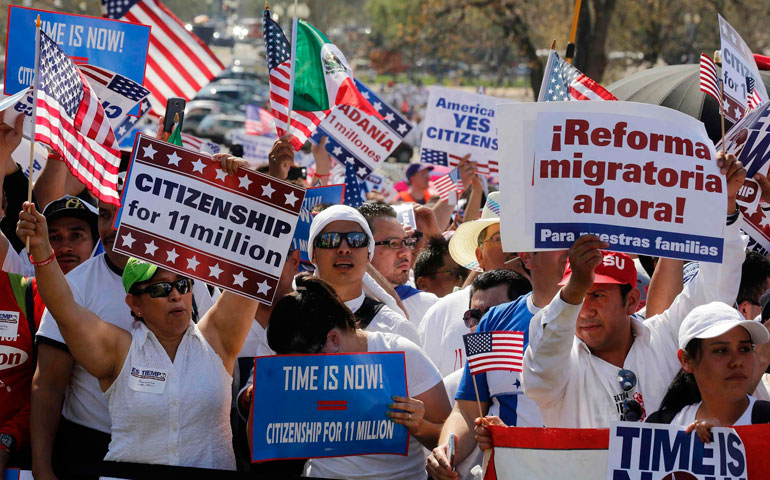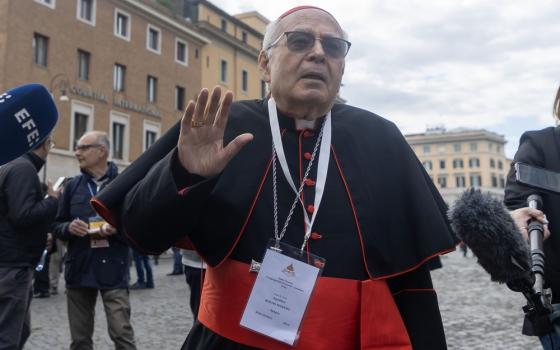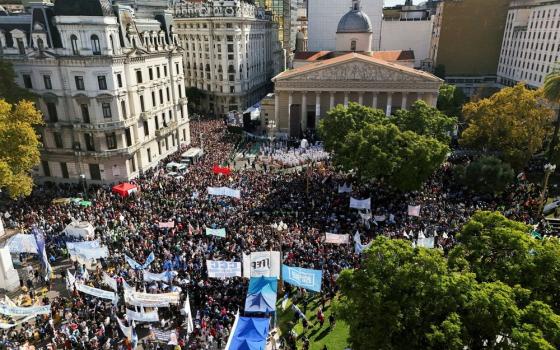
People rally for comprehensive immigration reform April 10 near the U.S. Capitol in Washington. (CNS/Reuters/Larry Downing)
Comprehensive immigration reform appears closer than ever, after a bipartisan group of senators, the "Gang of Eight," put forward a proposal that represents months of careful negotiation and calibrated compromises.
The push for comprehensive reform has the support of a wide variety of religious organizations, including the U.S. Conference of Catholic Bishops, the National Council of Jewish Women, NETWORK, and Lutheran Immigration and Refugee Service. All voiced praise for the proposal from the Gang of Eight, although they also called for improvements in the legislation. Three hundred evangelical Christian leaders met in Washington April 23 the day the proposal was announced to praise the reform effort as well.
One of the biggest controversies, creating a pathway to full citizenship for undocumented immigrants, was resolved by establishing a 13-year waiting period for full citizenship but not insisting that those who apply leave the country while waiting. The DREAM Act, designed to grant citizenship to those brought to the country without documentation as children, was greatly expanded, reducing the time limit to five years.
Both measures will help bring undocumented immigrants "out of the shadows," said Kevin Appleby, director of the U.S. bishops' Committee on Migration.
The proposal contains triggers, requiring certain border security benchmarks be met, before the benefits kick in. It provides $6.5 billion in new funding for border security. And negotiators got both the AFL-CIO and the Chamber of Commerce to agree to provisions governing migratory workers.
Family reunification remains a sticking point, as the proposal eliminates expedited visas for adult children and siblings of U.S. citizens and green-card holders.
Four Republican senators, Marco Rubio of Florida, Jeff Flake and John McCain of Arizona, and Lindsey Graham of South Carolina, joined with four Democratic senators, Charles Schumer of New York, Bob Menendez of New Jersey, Dick Durbin of Illinois, and Michael Bennet of Colorado, to form the Gang of Eight. Their legislation is known as the Border Security, Economic Opportunity and Immigration Modernization Act of 2013, or S. 744.
Rubio's support for the measure is considered critical because of his strong affiliation with the tea party wing of the GOP caucus. Schumer led the Democrats in negotiating the policy differences between the two sides.
To bolster support, New York Cardinal Timothy Dolan, president of the bishops' conference, joined Los Angeles Archbishop José Gomez and Salt Lake City Bishop John Wester on a conference call with reporters April 22. Gomez and Wester are chairmen respectively of the bishops' migration and communications committees.
"Perhaps more than any other religion in the United States we are a faith of immigrants," Dolan said. "We've been a nation of immigrants but it's almost as if the Catholic church is an icon of the immigrant makeup of the United States of America."
The bishops expressed the hope that the Gang of Eight's proposal could be amended to shorten the waiting time for undocumented immigrants to become citizens from the proposed 13-year wait to less than 10 years. They also called for stronger family reunification provisions.
Gomez linked the immigration battle with the bishops' ongoing religious liberty campaign. "That is one element of the campaign, the Fortnight for Freedom, to point out the religious freedom aspects of serving immigrants and refugees," he said. "We've seen in Arizona and other [state's] laws attempts to criminalize assistance at times to immigrants and refugees, which would impose on our pastoral mission."
The "Fortnight for Freedom" was a two-week effort last year to call attention to the issue of religious liberty. The bishops' conference is planning a second fortnight this summer.
Dolan forcefully rebutted claims by some conservative opponents of immigration that the recent bombing in Boston should cause Congress to delay reforms. Two immigrants are suspects in the bombing.
"To label a whole group of people, [who are] mainly ... hardworking, reliable, virtuous immigrants, to label them and to demean them because of the vicious tragic action of two people is just ridiculous. That's illogical. That's unfair. That's unjust," Dolan said.
Social Service Sr. Simone Campbell, executive director of the Catholic justice lobby NETWORK, echoed Dolan's words. "The need for commonsense immigration reform is urgent, and we are appalled that some in Congress would use the Boston Marathon tragedy as a pretext for slowing down -- or even halting -- current progress in reaching that goal," Campbell said in a published statement.
"We were pleased ... when legislation was finally introduced, and we'll do everything possible to move it along while pressing hard for the fairest bill possible," she said. "Our country deserves to have our broken system addressed now. It is shameful that it has taken this long to get this far."
When asked if there were any "deal breakers" in the proposed legislation, Appleby said, "No, not currently. There are things that give us heartburn."
He cited the border control triggers and the increased militarization of the border. Still, Appleby was optimistic. "The proposal brings people out of the shadows and protects families. That is the key thing."
Politically, the issue appears more salient as Republicans continue to ponder the 2012 election results in which GOP-presidential candidate Mitt Romney garnered only 27 percent of the Latino vote. Latinos are the fastest-growing demographic group in the country and a party that can't win a significant share of their ballots is doomed to failure.
On the other hand, many Republican members of Congress represent gerrymandered districts in which their only real threat to re-election is a GOP primary challenge from the right. Groups like FAIR, the Federation for American Immigration Reform, are trying to scuttle the congressional effort and have begun blanketing conservative talk shows with advertising calling the Gang of Eight proposals "amnesty."
Rep. Bob Goodlatte (R-Va.), chair of the House Judiciary Committee, has indicated that he will take up immigration issues piecemeal, an approach many think will doom the reform effort. Anti-reform leaders include some prominent Catholics, such as Rep. Lou Barletta (R-Pa.) and Rep. Steve King (R-Iowa).
In an interview last month, McCain pledged that the Gang of Eight would oppose so-called "poison pill" amendments. In 2007, opponents of reform put forward a host of poison pill amendments that force members of Congress to vote against a key constituency or make the bill unpalatable to members of the other party.
In the coming debates, it is expected that the treatment of lesbian, gay, bisexual and transgender families could prove to be one such poison pill, as liberals push for their inclusion and conservatives, including some religious supporters, threaten to walk away from the bill if it creates backdoor recognition of same-sex unions.
On the conference call with reporters, Dolan called attention to a recent poll that indicated 77 percent of U.S. Catholics support immigration reform, including a pathway to citizenship.
"We're talking about an essential element of Catholic doctrine. This isn't some wild left-wing cause here, this is classic Catholic teaching," Dolan said. "The popes, the Holy See, the magisterium have been clear about the rights of the immigrant, the right of the refugee. So this isn't just some new, popular bandwagon that the bishops, that the church is jumping on."
[Michael Sean Winters writes about religion and politics on his Distinctly Catholic blog on the NCR website, at NCRonline.org/blogs/distinctly-catholic, first-place finisher for Best Individual Blog in the 2012 Catholic Press Association competition.]






